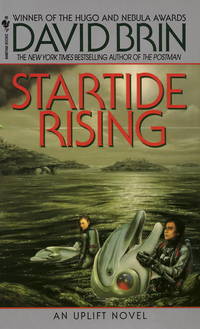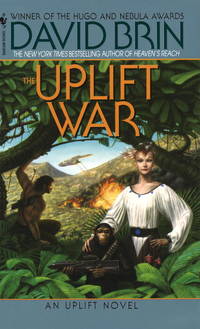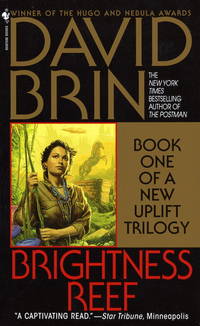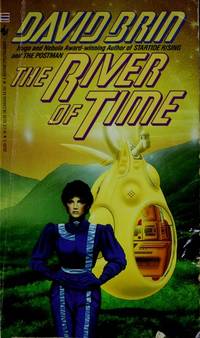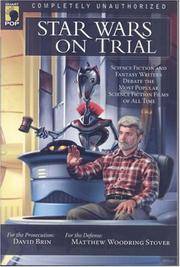He is the winner of both the Hugo and Nebula Awards. He lives in Southern California and has been both a NASA consultant and a physics professor.
Science Fiction authors are often best-known for their keynote "universe" stories and novels, that share a common projected future history. Although they make up a minority of David Brin's works, his
Uplift series has won a large core following in the SF community, twice winning the international Science Fiction Achievement Award (Hugo Award) in the Best Novel category. Consisting of two trilogies that include
Sundiver,
Startide Rising and
The Uplift War, this future history depicts a huge galactic civilization responsible for "uplifting" all known intelligent forms of oxygen breathing life. In these novels humanity is an anomaly since there is no known "patron" species responsible for their uplift from animal pre-sapience -- though, ironically, they independently have done the uplift "favor" already to dolphins and chimpanzees. As relatively un-educated upstarts humans therefore have limited understanding and appreciation of the subtleties of galactic culture.
The Uplift Series
* Sundiver (1980)
* Startide Rising (1983)
* The Uplift War (1987)
* The Uplift Storm Trilogy:
o
Brightness Reef (1995)
o
Infinity's Shore (1996)
o
Heaven's Reach (1998)
* Contacting Aliens: An Illustrated Guide to David Brin's Uplift Universe written with Kevin Lenagh
* There is also an Uplift supplement for the roleplaying game GURPS allowing players to play out adventures in the universe detailed in these novels. Although he did not write it, he did contribute information to it.
Other well-known works by David Brin include his book that completes and ties up all of the loose ends in the legendary Asimov's Foundation Universe:
*
Foundation's Triumph (1999)
and his stand alone novels:
*
The Practice Effect (1984)
*
The Postman (1985) (Filmed by Kevin Costner as a major motion picture with disappointing box-office numbers; Brin has spoken kindly of the film, a generosity shown by few of his fans, who found it deeply disappointing.)
* Heart of the Comet (1986) (with Gregory Benford)
*
Earth (1990) (Hugo Award 2nd place)
*
Glory Season (1993)
* Kiln People (2002)
o Kiln People (published in the UK as Kil'n People) had the dubious distinction of finishing second in four different awards for best SF/fantasy novel of 2002--the Hugo, the Locus, the John W. Campbell Award, and the Arthur C. Clarke Award--each time finishing behind a different book.
* Forgiveness (2002) (Graphic novel set in the Star Trek: The Next Generation universe)
*
The Life Eaters (2003) (Graphic novel published by the Wildstorm imprint of DC Comics, art by Scott Hampton)
His short fiction has been collected in:
* The River of Time (1986)
*
Otherness (1994)
*
Tomorrow Happens (2003)
Brin wrote the storyline for Ecco the Dolphin: Defender of the Future.
Several of his novels refer to the fictional Anglic language, a future variety of English.
Brin also wrote a number of critical articles on Star Wars and George Lucas for the website salon.com here. Brin focused on what he called an "agenda" on the part of Lucas, describing how he believed the basis of the Star Wars universe was profoundly anti-democratic. These essays inspired a debate-format book:
Star Wars On Trial which entertainingly clashed "defense vs prosecution" testimony covering a dozen political and philosophical and storytelling charges against the Star Wars Universe.
Brin's work focuses on a number of themes common to contemporary North American science-fiction literature. Speaking of Brin's 'original' works (works not set into pre-existing series or "universes"), his primary focus is the impact on human society of technology man develops for himself. This is obviously most noticeable in The Practice Effect, Glory Season and Kiln People. His Uplift collection, while embracing a wide set of concerns, can also be so characterized: ultimately, the story of the series is Humanity's re-ordering and reconception of the universe through the genetic engineering of dolphins and chimpanzees to sentience.
Also interesting to note is the impact of Brin's Jewish heritage - especially, the concept of Tikkun Olam - "repairing the world" - the notion that persons have a duty to make the world a better place to live in. While originally a religious concept, Brin, like many non-orthodox Jews, has reconfigured this into a secular notion of working, as one can, to aid the general status of the human condition, increase knowledge, and to prevent long-term evils from occurring. Brin has confirmed that this notion in part underscores the notion of humans as "caretakers" of sentient-species-yet-to-be, as he explains in a concluding note at the end of Startide Rising. Another interesting motif is the importance of laws and legality in many of his novels, whether intergalactic law in the Uplift series or the more mundane law of near-future California in Kiln People.
Unlike some sf writers who revel in the extremity of their imagined human societies, while Brin's novels feature profound, fundamental changes to the human condition (wrought by technology change and various events), these changes are always mediated by an intrinsic human instinct towards moderation. In short, these are different worlds but ones where the basic subjectivity of human experience, belief and rationality are easily recognizable as those that have governed most of the liberal West since the Enlightenment.





